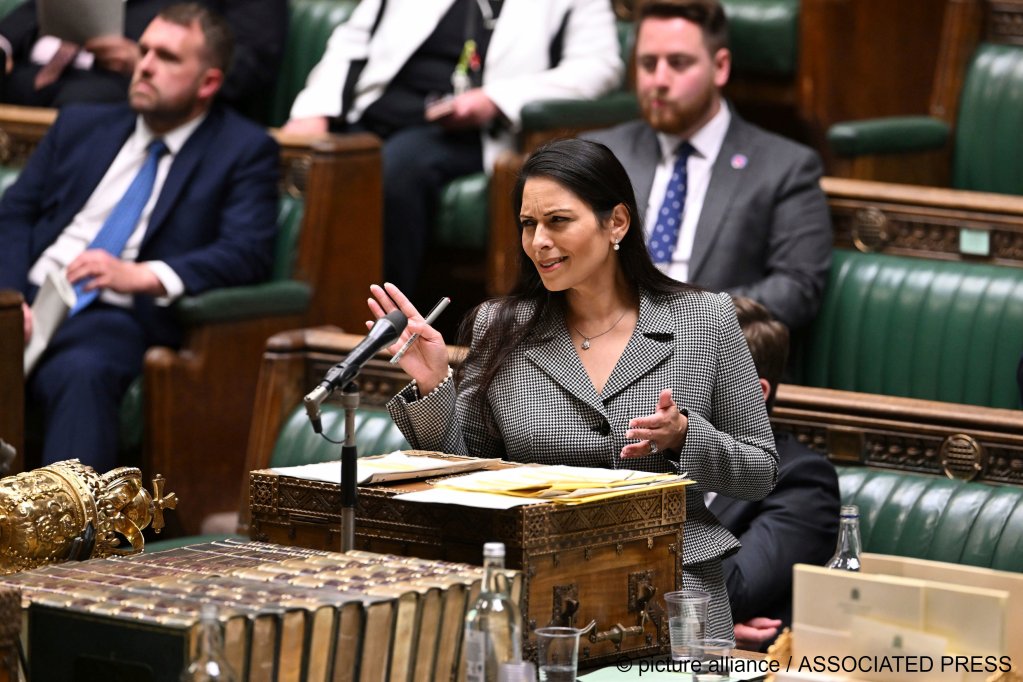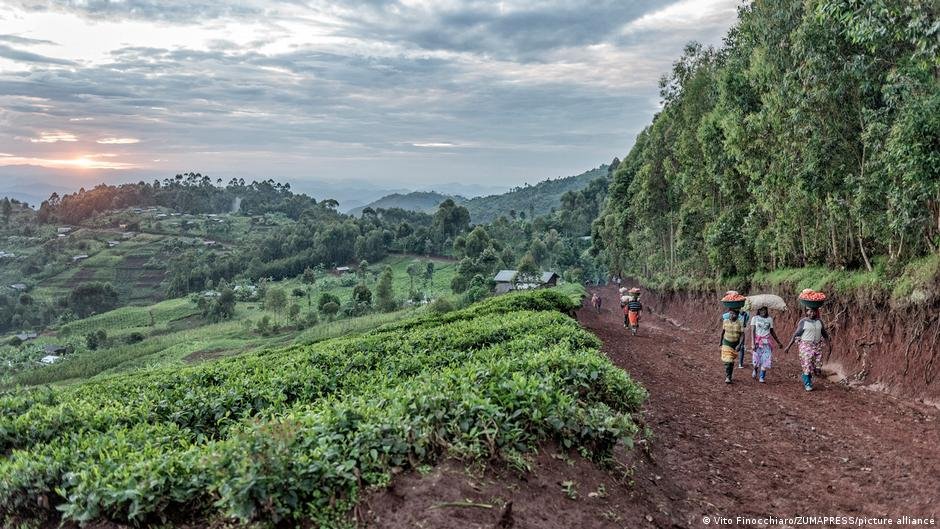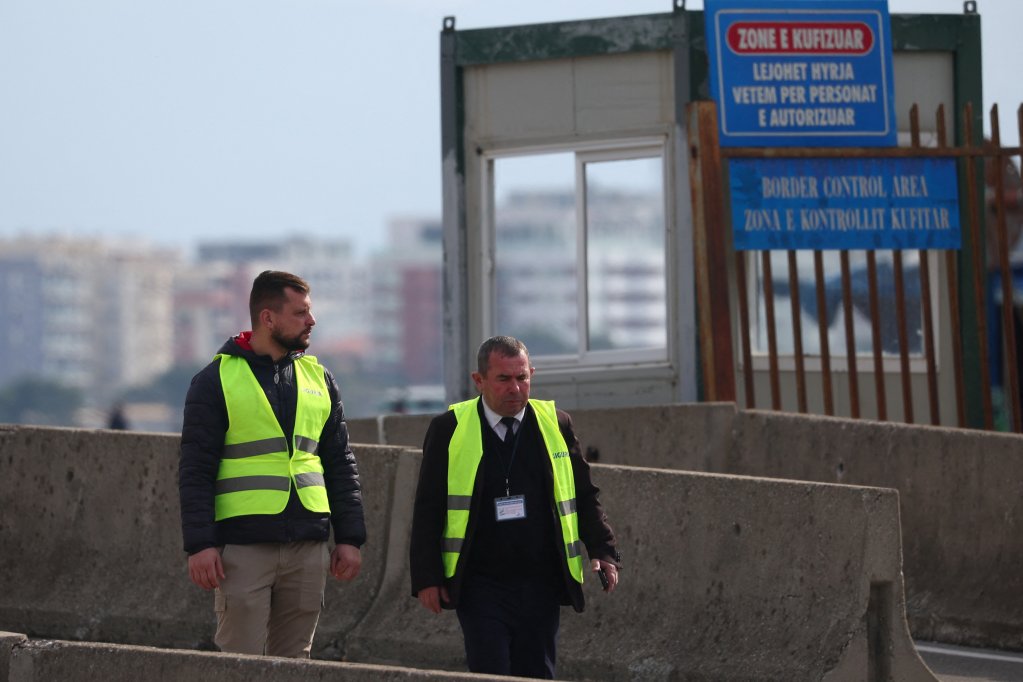The British government’s latest attempt to push its Rwanda plan through parliament has suffered a series of defeats and amendments in the House of Lords this week. Despite this, some European conservatives say they want Europe to follow a similar route.
The Safety of Rwanda (Asylum and Immigration) Bill -- the British government’s latest attempt to make its Rwanda policy law -- is having a bumpy ride in parliament’s House of Lords this week. The bill aims to approve Rwanda as a safe country -- a confirmation that would allow the British government to send irregular migrants there.
On Monday (March 4) and Wednesday (March 6) the bill was debated and amended by the Lords in what is called a "report stage."
Ten votes were staged on proposed changes to the bill. After two long debates, members voted in favor of all the amendments -- so, the government essentially suffered ten defeats.
Also read: UK government announces more measures to reduce migration
Changes implemented from the two days include: handing back some decision-making power to the courts, forcing the government to consider the individual cases and circumstances of asylum seekers and allowing a monitoring committee to report findings about any relocations to parliament.
Members also voted in favor of propositions to require lawmakers to "consider credible evidence that Rwanda is not a safe country."
Appeals back on the agenda of the Rwanda bill after Lords' reading
Also on Monday, members of the House of Lords voted to remove a clause of the bill that would have barred courts from considering appeals against removal decisions on the grounds that Rwanda is not a safe country, or that the removal was in contravention with international obligations or international law.

On Wednesday, members instigated further protections for people who may be victims of modern slavery or human trafficking and wrote in exemptions for people who have worked for the armed forces or UK government.
Also read: EU court reminds UK of 'legal obligation to comply' over Rwanda policy
Even some members of the ruling Conservative party spoke out against the current form of the law. Christopher Tugendhat, a Conservative Lord, accused the government on Monday of behaving like the ruling party in George Orwell’s novel 1984, a fictional tale about how government can slide into dictatorship.
"Normally, 1984 is invoked in relation to government behavior, laws, events and so forth in tyrannies and dictatorships," he said. "This country is no dictatorship -- it is a democracy. Nevertheless, in this bill, the government are seeking to achieve by act of Parliament what in 1984 the ruling party and its apparatchiks sought to achieve by torture."
'If this bill [is passed] Rwanda will be a safe country regardless of reality'
Tugendhat continued: "If this bill goes on to the statute book in its present form, Rwanda will be a safe country regardless of reality."
In Tugendhat’s view, taking account of reality would involve consulting and following the opinions of institutions like the Supreme Court, as well as examining the present political situation in Rwanda and how it might evolve in the future.

He said it shouldn't be possible for the government to overturn a court decision they don't like.
"That is what the rule of law is all about," said Tugendhat, citing former Conservative Party Leader Margaret Thatcher.
Costs of Rwanda partnership mounting up
The bill is due to have a third reading on March 12. Prime Minister Rishi Sunak is still hopeful that flights to Rwanda might take off in the next few months, giving his government time to implement their plans before an expected general election in the autumn.
Also read: Rwanda explained, from politics to human rights and refugees
Last week, a detailed study into the finances of the Rwanda Bill was released by the National Audit Office (NAO). Parliamentary committees and the NAO had repeatedly expressed concerns over the potential costs of the scheme, since the government had previously declined to release all the financial commitments they had made with Rwanda.
However, the NAO revealed that under the UK-Rwanda partnership, the British government "will pay £370 million to the government of Rwanda" as well as a further £20,000 for each individual who is relocated.
Additionally, a further bonus of £120 million (about €140 million)will be paid to the East African government once 300 people have been located.

Over five years, the UK will pay an additional £150,874 per individual (about €175,500) for "processing and operational costs." If an individual subsequently decides to leave Rwanda, the UK will then pay £10,000 per person (about €11,700) to help facilitate their departure.
According to the NAO, by February 2024, the "Home Office [UK Interior Ministry] had incurred direct costs of £20 million (about €23.4 million) setting up the partnership." This figure was expected to rise to £28 million (about €32.7 million) by the end of 2023-24. The Home Office also expects to incur "further costs between now and the end of the scheme."
Critics expressed 'shock' at costs to UK taxpayer
To set up the partnership, the Home Office has incurred around £2 million (about €2.3 million) in direct staff costs, around £2.3 million (about €2.7 million) in legal fees and around £15.3 million (about €17.8 million) in set-up costs for escorting people to Rwanda and providing training facilities. By the end of 2024, the Home Office says escorting costs could total £23.5 million (about €27 million).
Also read: UK government pledges to push Rwanda plan through 'at all costs'
Looking into the future, staff costs per year could reach £1 million (about €1.1 million), plus £11,000 (about €12,800) per relocated individual to pay for flights and travel to Rwanda, as well as £12.6 million (about €14.7 million) for training costs in the tax year from April 2024 to April 2025.
Even if the UK sends no one to Rwanda, the UK has already committed £370 million (about €433 million)to the scheme.
Labour MP Diana Johnson, who chairs the Foreign Affairs Select Committee and has repeatedly interrogated the government about its plans and the forecast costs, expressed shock at the figures.
"What we are left with is a very expensive program the government hopes may offer a deterrent to those seeking to cross the Channel in small boats. Yet, there is little evidence for this either," Johnson told the Guardian.
European conservatives hope to adopt similar plans across the bloc
Despite the continued debates and rising costs of the Rwanda plan, conservative leaders across the EU are eyeing it and Italy’s similar Albania plan as examples of policies the rest of the continent should implement in the future.
For example: The EU Parliament's conservative European People’s Party is calling for asylum seekers to be removed to "safe third countries," according to a report from the French news agency Agence France Presse (AFP).

"We want to implement the concept of safe third countries," reads their manifesto.
Possible candidate countries include Rwanda, Ghana, Georgia and Moldova. However as has been seen with the Rwanda plan, this kind of deal is often criticized for contravening basic human rights laws and may be difficult to turn into a reality.
With AFP and Reuters
